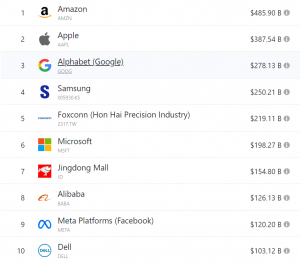
Big tech regulation: The Competition Commission of India has imposed a hefty fine on Google for abusing its dominant position in Play Store and undermining competition. The anti-trust regulator has slapped the penalty, the second in a week, as the search engine firm was found indulging in anti-competitive practices. The regulator has directed the tech giant to refrain from doing so in future. Google will have to shell out Rs 936 crore which may not make a dent on the finances of the company that earns huge revenues in the country.
Google is accused of restricting the choices for app providers and users by allowing payments only on its app store platform. This virtually denies market access to competing mobile wallets such as PhonePe, Paytm etc and other apps that facilitate payment through the United Payments Interface (UPI). In its order, the CCI noted that the search engine forced app developers to use its own payment systems for in-app transactions. Selling in-app digital goods make an important source of revenue for developers who are forced to transfigure the payments system to be compatible with Google’s payment system.
READ | Telecom Bill 2022 draws flak for breach of privacy, TRAI powers
Hence, all purchases of the digital goods go through Google’s payment system, which processes the transactions. The US tech giant has been asked to modify its conduct in a particular timeframe and other corrective measures have also been recommended. This includes freedom for app developers to use third-party billing or payments systems.
The Alphabet Inc-owned entity is the latest big tech company facing regulatory action. In fact, policymakers and governments across the globe have been scrambling to regulate such companies that have outgrown their functions and have become a global headache. A slew of legislation is hence under way in Europe, the US, and some Asian countries as well.
The issues majorly revolve around the impact of these companies on people’s privacy, survival of smaller companies and competitions in general. While these companies enjoy unlimited powers over their subscribers, people usually have no power over the various tech platforms they use.
Market valuation of top 10 tech firms

For instance, most of the devices these days come with pre-installed apps that cannot be deleted. This poses problems for smaller tech companies which struggle to be recognised amid a sea of service providers and lose out to bigger competitors. Also, big tech is often accused of using personal information for monetary and other considerations without impunity.
Big tech regulation in India
The government has been strengthening regulation of multinational tech giants. On the heels of its order against Google, the Competition Commission of India is also expediting a probe against Apple Inc. The verdict for the same is expected to be finalised by the end of January.
The Centre also started hectic deliberations over regulating Big Tech’s data collection and usage policies after parliamentarians expressed their concerns on the same. This is especially pertaining since the information collected by big tech is misused towards stifling genuine competition in the market. In August, a proposal was floated to bring out a new Digital Markets Act to govern business practices, including data collection and use by digital economy companies. It also proposed introduction of certain guidelines in the Competition Act to address the concerns. To formulate the same, global best practices were also evaluated to arrive at a consensus.
Meanwhile, tech companies have termed the remedial measures imposed by the CCI as excessive and disproportionate. Analysts in favour of these companies have also said that penal fines must have clarity and transparency so that they are easier to comply with.
On its earlier penalty, Google had said that it would review the decision to evaluate the next steps and asked the CCI probe a major setback for businesses and for Indian consumers. The company had argued that the move will open serious security risks for Indians who trust Android’s security features and raise the cost of mobile devices for Indians.
The market valuation of big tech firms has reached unprecedented heights. The top five technology firms — Google, Amazon, Meta, Apple, and Microsoft — collectively enjoy $10.31 trillion valuation. In the last five years, they grew fourfold. Shockingly, the annual revenues of these firms are higher than the GDP of most world nations which is the reason behind the urgency shown by national governments to bring in regulation.
And while the companies agree that there is a need for regulation, they are not willing to offer much in self-regulation. Though there are growing apprehensions about social media platforms, it has been difficult to tame these companies because most of them are based in the US, a country with strong free speech laws.
Consumers are also unable to alter the ways they use these companies’ products and services. Most people do not understand the intricacies related to technology, while others are not perturbed enough to make any substantial change.
Global efforts in big tech regulation
The European Union is on a mission to rein in US tech giants which have been accused of tax avoidance, stifling competition, raking in billions from news without paying for it and spreading misinformation.
READ | Ecommerce boom: India must ensure that small players too benefit
In the last few years, governments have slapped hefty fines on Apple and Google in tax and competition cases. Efforts have been made in drawing landmark laws to curb the market dominance of big tech. In fact, democracies are also struggling to curb hate speech amplified through platforms such as Facebook and WhatsApp.
A long list of dos and don’ts has been floated by the EU which singles out the world’s most iconic web giants as internet “gatekeepers” and subject them to special rules.
The EU also recently made the Digital Markets Act (DMA) a law. Under this, a list of obligations for designated Gatekeepers has been set and in case of non-compliance, there will be enforced sanctions mechanisms, including fines of up to 10% of the worldwide turnover. One of these obligations entails prohibitions on combining data collected from two different services belonging to the same company (e.g., Facebook and WhatsApp).

